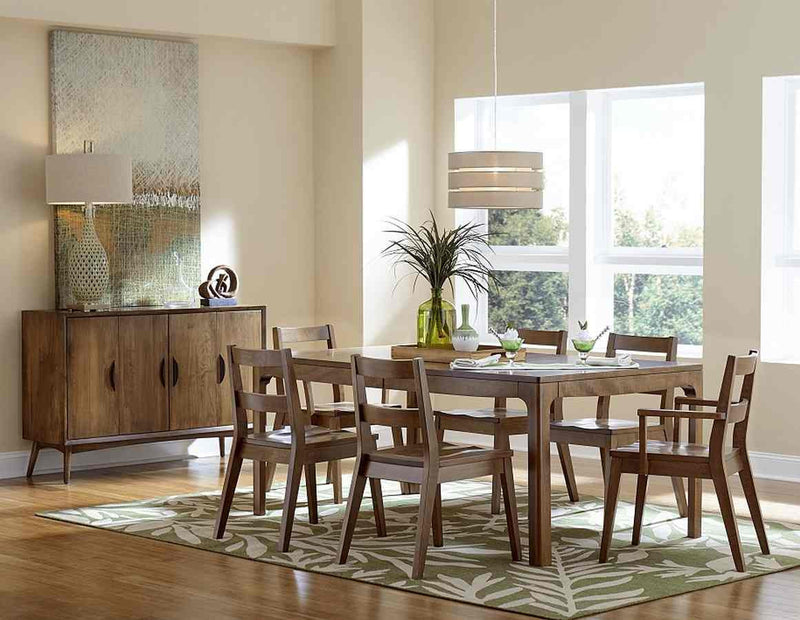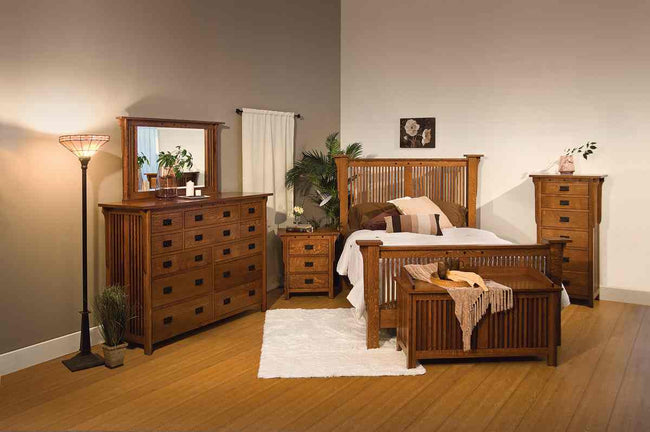Our builders work with a selection of only the responsibly harvested North-American hardwood species including Red Oak, Quarter Sawn White Oak, Brown Maple, Hard Maple, Hickory, Elm and Cherry. Each type has unique qualities and characteristics like weight, density, grain pattern, and price. So here is a quick run down of our most popular woods. For a better explanation, and to see the woods in person, come visit our Evanston showroom.
The Woods
Oak
Oak is dense and hard with a deep natural grain that has texture you can see and feel. Oak is very practical and functional because it is resistant to dings and dents. A solid oak dining table is best for everyday use especially for families with young children.Red Oak is only grown in North America and is readily available making it the most economical of all hard woods. Many of us live in homes and apartments with doors, floors & wall trims made of Red Oak.


Regular Oak Quarter Sawn
Quarter Sawn White Oak was used even more in the past. The name refers to how the logs are divided up and sawn into building stock. The unique preparation process gives Quartersawn Oak a unique appearance. The grain looks more even than regular oak but it has some very interesting swirls going across the grain. This effect is often called ray flake, and it is actually the vascular tissue of the tree being revealed in cross-section. Quartersawn white oak was often used in craftsman and bungalow homes and it makes a wonderful choice for Mission and Arts and Crafts styled furniture.
QSWO is sturdy, stylish and has more visual interest than red oak. Any stain color brings out its rich wavy grains that have tight even swirls. The craftsmanship inherently makes it in a bit higher price range than regular oak. Oak is very practical and functional and with our two step finishing it is resistant to dings and scratches.
Maple

Maple (above) is a hard wood that is smooth to the touch with a tighter grain than Oak. The advantage of Maple is that it has a silky look that is very smooth and in the case of Brown Maple, is in the more economical price range of hard woods.
Brown Maple is somewhat light in weight and absorbs colored stains well. Its smoorth grain works well in contemporary and modern pieces yet it has a soothing and welcoming presence. It fits any dining style use from every day to more formal.
Hard Maple on the other hand has the same smooth look but is much denser, heavier and harder. It is also a bit higher priced. It is so dense that some stains take to it poorly. When used for a dining room it makes a statement that is bold and elegant. Hard maple dining rooms make a distinctive, durable addition to any home.
Walnut
Walnut (below) has bold flowing grains that make a big style statement. Walnut graciously shows dark to light patterns that give a dining room a sophisticated look. Walnut is crafted in furniture to look slim and sleek with clean lines and a straight cut design. It is always popular but has recently gained popularity in more urban types of décor. Walnut is a bit harder that brown maple, but not as hard as oak; it tends to be the one of the most expensive woods.

Elm
Elm (below) has beautiful dark and light lines with small flakes in between. A dining room filled with an Elm hutch, table and chairs, reflects unique taste. When looked at closely it resembles Quail feathers that give it a feeling of being one-of- a-kind design. Elm is a very strong wood with particularly impressive tensile strength and ability to be bent and shaped.
Cherry
Cherry has smooth even patterns with tiny pits.
Cherry has soft lines of light curves with dark outlines and a rich, smooth grain. It also has small darks spots and flecks throughout....these are pits and mineral deposits in the wood. The inherent nature of cherry causes it to darken with exposure to light, especially when given a natural (no-stain) finish. Cherry is softer and lighter than some other hardwoods making it more prone to dings and dents than harder woods like oak. Cherry wood dining furniture gives warmth and elegance to any room.

Rustic Cherry wood has the same beautiful grain pattern as regular cherry, but it has significantly more pits and mineral deposits in it, even including cracks and knots. Choosing rustic cherry is a nice way to save cost while going with the beautiful look of cherry. Other woods, like Quartersawn Oak and Hickory are also available in "rustic" versions for a somewhat lower price.
All woods are beautiful in style and appearance. Each piece is crafted to speak to the way people live today. Solid wood dining room furniture has brought enjoyment to generations of people; we are glad to help bring it to your home too!


